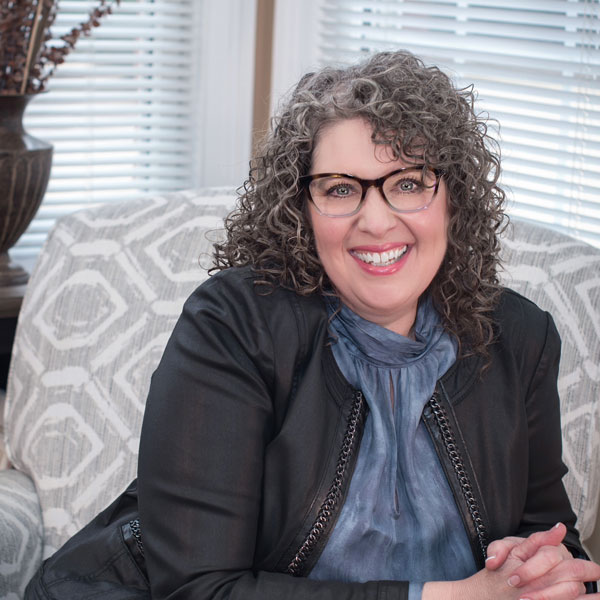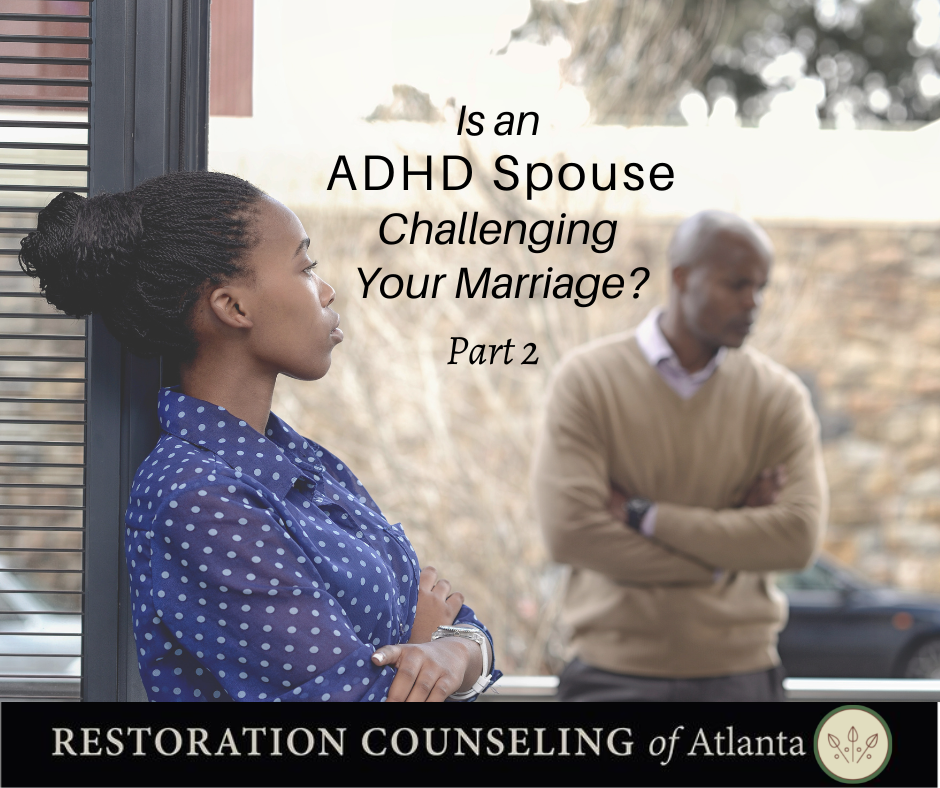Part 2
Our last article examined what ADHD is and what symptoms regularly appear in marriage. Today, we will explore some key strategies that can increase compassion and satisfaction in your relationship and improve the impact of ADHD on your marriage.
Things to Avoid
Parenting the ADHD Spouse: Nagging, failing to take ownership of your actions, or falling for the lie that you can parent your spouse kills the romance in the relationship. Instead, if the ADHD spouse acknowledges what they are struggling to complete, seeks out medical support, and works to get better rest, then they are doing their part to improve the situation.
The Blame Game: This erodes your relationship and prevents recognition and a climate for growth that is essential when facing a challenge. Instead, it is helpful to separate the person from the symptoms. Recognize good intentions rather than focusing on positive outcomes, and reflect on your own inward struggles and difficulties. Admitting your challenges goes a long way to building goodwill in the relationship!
Losing Faith: When the negative patterns of dealing with ADHD take over the marriage, individuals become weary of trying. Antidotes to this loss of faith include:
- Refocusing on who you want to be in your relationship.
- Channeling frustration at the ADHD and not the person.
- Pursuing therapeutic help.
With these steps, you will rediscover the person you married and find hope in the relationship and your potential as a couple.
Three Steps to Building a Better Relationship
- Pursue Empathy for Your Spouse – Acknowledge that you and your spouse are different, and learn to embrace those differences rather than spending time condemning them or being agitated with them. The non-ADHD spouse should spend time listing the things they love and appreciate about their spouse (notice the positive intensity they bring to the relationship). For example, the ADHD spouse can write a letter explaining what life is like for them to give their spouse an increased understanding of their internal world. The ADHD spouse should also consider where there is an imbalance of responsibilities in the relationship and work to create mutual wins for their spouse.
- Identify and Address Obstacle Emotions – Since there are many repeating cycles in marriages with ADHD, it is helpful to know the common stuck points and begin to watch out for them. These include fear of failure, chronic anger, denial, and hopelessness. We can address the fear of failure by acknowledging the real ADHD challenges, validating the ADHD obstacles, and creating ADHD-sensitive cooperative solutions to the challenges. It’s important to note that anger and denial often come together, leaving many couples hopeless.
- Both of you should get treatment – It’s important to acknowledge that it takes cooperation and enacting multiple strategies to beat the struggles of ADHD in your marriage. Only one person seeking help will not make enough of a difference. The three-legged stool is the best approach, including:
- Making physical changes to your body (for the spouse with ADHD).
- Making behavioral or habit changes (which is made more accessible after the first step).
- Develop strategies as a couple that help you improve your interactions.
Paradigm Shifts
Following are some samples of positive Paradigm Shifts from Melissa Orlov’s book, The ADHD Affect on Marriage.
For the Non-ADHD Spouse:
| Old Way | New Way |
| The ADHD is to blame, or my spouse is to blame. | Neither of us is to blame, and we are both responsible for creating change. |
| Medication will turn our lives around. | Good treatment has “three legs” and takes time and effort. I will be supportive and patient. |
| I must teach my ADHD spouse to do it better and/or compensate for all he or she cannot do. | I am never my spouse’s keeper. We will respectfully negotiate how we each can contribute. |
| My spouse’s incompetency forces me to take over everything and has stifled my life. | I am only responsible for my own personal growth and deciding what to do with my life. |
(Orlov, Melissa, The ADHD Affect on Marriage, pg 139)
For the ADHD Spouse:
| Old Way | New Way |
| I don’t really understand when I might succeed or fail. I’m not sure I want to take on challenges. | My inconsistency in the past has an explanation: ADHD. Fully treating ADHD will enable greater consistency and success. |
| ADHD may or may not be a factor, and I’m talking meds, so it’s being taken care of. | Untreated and undertreated ADHD symptoms hurt my relationship much more than I realized. I will aggressively pursue all responsible paths of treatment. I’m committed to becoming the best partner I can be. |
| I always take life as it comes at me. | I like flexibility and may choose to take life as it comes, but better control over ADHD lets me choose to shape my destiny, too. |
| I am unloved/unlovable and unappreciated. My partner wants me to change who I am. | I am loved/lovable, but some of my ADHD symptoms are not. I am responsible for managing my negative symptoms. |
(Orlov, Melissa, The ADHD Effect on Marriage, pg 140).
If you take the presence of ADHD in your marriage seriously and learn to work together as a couple, you will see progress! With these steps, you have every reason to hope that you can change the primarily negative dynamics in your relationship to those of cooperation and appreciation. Though you will have struggles here and there, you will be able to lean back into these daily systems you have developed together and manage these problems efficiently.

Written by: Jennifer Stuckert, MA MFT, LPC, ACS, CPCS, NCC, Clinical Director
jennifer@restorationcounselingatl.com, ext. 111
Jennifer uses distinctly Christian counseling to help struggling individuals, couples, and families. She has served as the director and supervisor of the staff of Restoration Counseling of Atlanta since 2009. She has two decades of counseling experience, helping people gain relief from life challenges. Jennifer uses biblically sound methods with a specific emphasis on adaption according to personality and learning styles, and is also certified in EMDR.
Reference: The ADHD Effect on Marriage, Melissa Orlov

